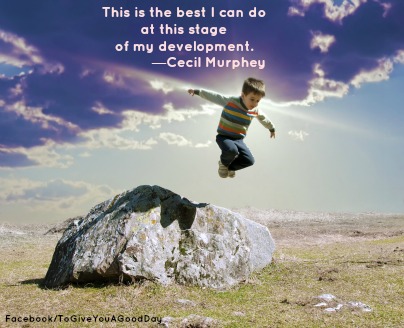
This post originally appeared at The Novel Way, a website of which I no longer am a part. But because of comments the blog post generated, I am reposting it here with minor changes.
Although visitors to my blog will mostly find posts that speak to the power of gratitude, occasionally readers get my musing on about various and sundry topics. Today’s topic is about the power of influence.
BlessBack®: Thank Those Who Shaped Your Life is a non-fiction book. It certainly has elements of fiction in it, as it is filled with stories of unique characters whose lives are triggered by an inciting incident that moves them from Point A to Point B and thus their stories resolve. But BlessBack is not a work of fiction.
As a number of you know, I am at work on rewriting a fiction novel I wrote quite some time ago.
Why?
Because of the power of suggestion by those who champion.
I attended an author event in the fall of 1993 in Faribault, Minnesota, not too far from where I live. Jan Karon, author of the wildly successful Mitford series, was the guest speaker. Afterward, she hosted a book-signing event. I stood at the end of the line. My turn came and I asked Ms. Karon if she had any advice for me, a beginning writer who had just completed the first 25 pages of her manuscript. She looked up at me as she finished writing her signature on my collection of her books and said, “I do….but I don’t know if you’ll take it.” I promised I would and she gave me this command: “Never give up.”
Raleigh, North Carolina. 2001. Killing time before the start of a seminar, I rented a car with a friend and together we drove through the Blue Ridge Mountains and found ourselves in Blowing Rock, the town after which Ms. Karon’s fictional Mitford is modeled. We stopped in an upscale antiques shop and while browsing, I overheard the shop owner say to someone who had just entered, “Well, I wondered if you were back in town. So nice to see you again.” I turned and Ms. Karon was 10 feet from me. The two women caught up on each other’s lives. Apparently, Ms. Karon no longer lived in Blowing Rock but Virginia and had just popped in to say hi before she headed to a friend’s for a short visit.
Two out-of-towners, who had only met before in a Minnesota shop years ago, were in a North Carolina shop at the same time? Crazy to experience real-time serendipity. Once Ms. Karon started to browse the store, I went to her and said that her words had stayed with me and I was nearly finished with my manuscript. She was pleased to hear I had used her words for a compass and as we parted she once again said those empowering words. I again gave her my promise.
On Palm Sunday weekend of 2002, I attended a writers’ conference nestled in the redwoods near Santa Cruz. Thanks to my husband who has supported me in every way through my attempts to maneuver the writing field (for the original meaning of this word, see the *asterisk below), I slapped my two thousand bucks down for the chance to connect with fellow writers, accost agents with my Great American Novel’s elevator pitch, and to collect my manuscript critique from fellow writers and agents, which surely, held a book contract paper-clipped to it.
Yes, my naïve eyes held stars the size of the Milky Way. I left California with an article to write on spec about Ragnar, the Minnesota Vikings’ mascot, as well as several invitations to send the first twenty-five pages of That Summer Place to agents and publishing houses. But I did not come away with a book contract.
I did, however, receive the gift of another encourager, Joy DeKok, at the Mount Hermon’s Christian Writers Conference. Joy is one of a handful of others, including Barbara Marshak and Ann Seymour, who have read my novel in each of its stages, from burnable to believable.
I left my story alone while three sons obtained their degrees and I returned to complete mine in December 2008 in Print Journalism and English. I thought my novel would remain forever in its dormant state. But one day earlier this year, I pulled out the manuscript and found myself recrafting the book’s first line.
“If I had known what was coming would I have used the knife differently?”
And so here I am, reworking a novel because of Ms. Karon’s imperative, my husband’s emotional and financial support, and from my encouragers’ words.
As I ring in the new year, I commit to rewrite my novel so that it is worthy of your reading time. To that end, your reading my blog posts as I live out the bleeding that goes on in a work-in-process will incentivize my final edits. I also hope this space becomes a conversation, one in which I may start, or you might, if you leave a comment that forces me to halt and respond.
Five years ago a friend said, “Why do you bother with fiction, Julie? There’s nothing to learn from it. Give me a ‘how-to book’ any day.” Her words disturbed me as Oprah Winfrey would say, “in a good way.” Not long after that conversation, I found a quote that encapsulates my reasons for my love of fiction. In Confessions of a Reluctant Catholic, Alice McDermott gave a remarkable response as to why she read and wrote fiction:
“…fiction made the chaos bearable, fiction transformed the absurdity of our brief lives by giving context and purpose and significance to every gesture, every desire, every detail. Fiction transformed the meaningless, fleeting stuff of daily life into the necessary components of an enduring work of art.”
That is how I see fiction, as a work of art that transforms ordinary life into the extraordinary. A great novel educates, persuades us to reimagine our lives and helps make sense of how we fit in our spinning world. As we turn its pages, we find those “necessary components,” which to me, are people like the ones mentioned above, who champion our dreams until they become real. I hope we’ll have many conversations together as we discover how this new genre at which I am now at work in helps shape and make sense of our everyday lives.
Until we meet again,
Julie Saffrin
*Maneuver,” according to Funk’s Word Origins and Their Romantic Stories, has its roots in two words: The Latin manus (hand), and opera (work). Another word, manure takes its meaning from maneuver. Manure comes from maynoverer, “to work with one’s hands. “…in early English usage, “to manure” meant to hold or possess land.” The way we use manure today dates from 1599.
About Julie Saffrin
Julie Saffrin is the author of numerous published articles and essays. Her latest book, BlessBack: Thank Those Who Shaped Your Life, explores the power of gratitude and offers 120 creative ways to journey toward positive, lasting change.

Comments